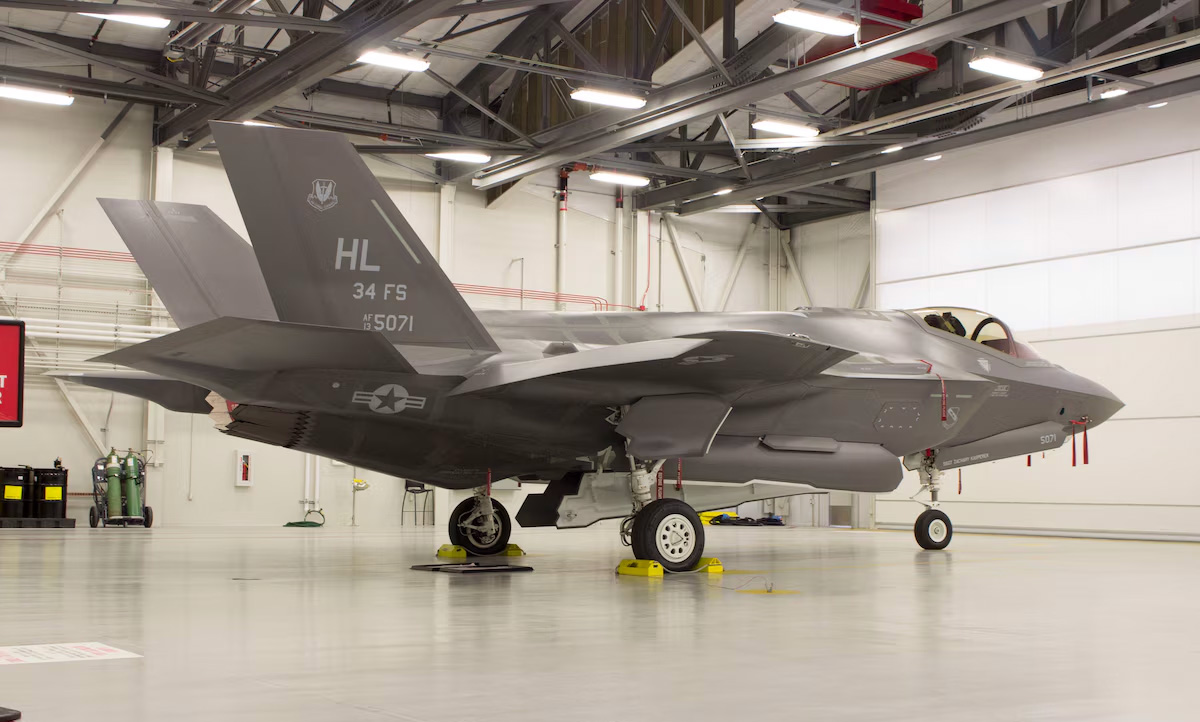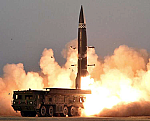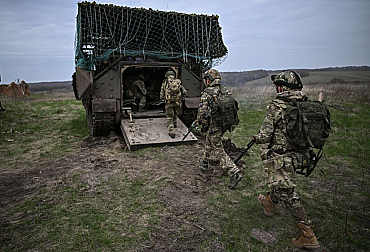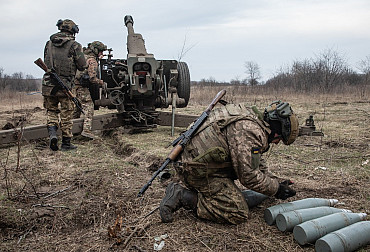European dependence on U.S. weapons as a security risk
U.S. President Donald Trump's unpredictability is leading Western states to reassess their dependence on U.S.-made weapons. Europe and Canada are now reviewing their vulnerabilities, including the alliance's air power strategy, due to rising tensions within NATO. Some member states are even beginning to consider less capable European alternatives to the U.S. F-35 fighter due to geopolitical developments.

From Canada to Europe, there are growing calls to move away from US weapons and focus on our own production. The suspension of intelligence sharing with Ukraine and Trump's threats to annexing Canada or Greenland have shown the risks of relying too heavily on the United States. Washington's foreign policy fluctuations have sparked media fears about grounding U.S. fighter jets or shutting down their launchers remotely (misinformation referred to as a "kill switch").
The real risk, however, is a halt in the delivery of spare parts, software updates or data sharing. Donald Trump indirectly hinted at such a possibility during the recent announcement of Boeing's production of the next-generation F-47 fighter aircraft. Trump stated that the version sold to allies will have limited capabilities "because one day they may not be our allies." In fact, this has happened several times in the past. When Ayatollah Ruhollah Khomeini's Islamic Revolution overthrew Shah Mohammad Reza Pahlavi in 1979, the then-U.S. government stopped providing maintenance and spare parts for U.S.-made Iranian aircraft. After the Egyptian military overthrew President Muhammad Morsi in 2013, the White House (temporarily) froze deliveries of fighter jets, attack helicopters and other equipment to Cairo. Finally, consider Trump's decision during his first term to suspend Turkey's participation in the F-35 program because of its purchase of Russian S-400 air defense systems.
The US can restrict the operation of F-35 fighter aircraft in a similar way to smartphones. If you stop updating their software, they gradually operate less and less efficiently and lose the ability to use the latest apps. You will still be able to make calls or send messages from them, but they will become obsolete over time. The success of F-35 fighters depends on top-notch software, even though they can still take off, fly and land without updates. However, the ability to fight, adapt to new threats and penetrate advanced defenses will be severely compromised without regular updates. In modern warfare, where technology is evolving at an unprecedented pace, maintaining a technological edge is not optional, but essential. Even though it is a stealth aircraft, i.e. hard to detect by conventional radar, it is not invisible. It will not survive long in an environment with advanced air defenses unless it can track and assess enemy radars and countermeasures. To do this, it needs to constantly update its software solutions to analyze the threat environment.
In addition, New York's Intelligencer magazine reported on a ban on "independent testing" of the software by F-35 users outside the United States. This provision reportedly irked some U.S. allies at the time of the program's launch, but did not become a barrier to purchasing the fighters. Indeed, at the time of the agreements, no one expected the U.S. to ever be anything but a trusted ally. The only exception was negotiated by Israel, which presciently insisted on gaining control of the F-35 software and now operates the aircraft with considerably more autonomy. Critical data for the F-35s is stored in a software package called the Mission Data File (MDF), which is kept up to date by a team of developers at Florida's Eglin Air Force Base. Rules for some military systems (not just fighter aircraft) also require maintenance and updates to be performed by US citizens, and similar restrictions may apply to weapons produced by European manufacturers with US components.
U.S. allies' concerns came to a head when Donald Trump halted military aid and intelligence to Kyiv after a verbal exchange with Ukrainian President Volodymyr Zelensky in the Oval Office. Although the White House resumed support within days, it did not allay Western concerns. "People immediately said, 'Wait a minute. You mean they could just turn it on and off?' Countries and their leaders start to wonder if they're vulnerable to a U.S. policy decision," believes retired U.S. Lieutenant General Ben Hodges. In the context of the F-35 programme, Richard Aboulafia of AeroDynamic Advisory makes a similar point: "People are looking at these [F-35] aircraft and saying, 'Oh yeah, not only do we not want to give the US money, but we're also worried that they'll cut off support in the event of a conflict.'"
The acquisition of the F-35 fighters has been heavily criticised by some Danish officials, for example, who cannot come to Donald Trump's rescue because of his consideration of annexing Greenland. "As one of those who made the decision to buy the F-35 in Denmark, I regret it [today]," said Rasmus Jarlov, chairman of the Danish parliament's defence committee. "I can easily imagine a situation where the US demands Greenland from Denmark. And they will threaten us that if we refuse, they will deactivate our weapons and let Russia attack us." Rasmus Jarlov considers US arms purchases a "security risk". Copenhagen, he says, faces huge investments in "air defence, fighter jets, artillery and other weapons" in the coming years and must "avoid US weapons if possible".
In Germany, the political leadership stands firmly behind the intention to acquire US fighter aircraft, while industry is opposed. "If we use the increase in defence spending to make further purchases of finished products in the US, we will strengthen our dependence on others," warned Airbus Defence CEO Michael Schöllhorn. Germany will find itself "trapped by the F-35" if logistics support for the aircraft is stopped, according to Thomas Pretzel of the Airbus Defence union. Wolfgang Ischinger, the former German ambassador to the United States, is calling for up to "contract cancellation" if the Americans are allowed to limit the aircraft's capabilities.
Even the Canadians are now reassessing their dependence on U.S.-made weapons. "Canada is actively exploring possible alternatives to the U.S. F-35 fighter jet and will be in discussions with competing aircraft manufacturers," Canadian Defence Minister Bill Blair said in mid-March. Canada, according to Blair's statement, is looking at what will best serve its defence needs. "Our Air Force considered the American [F-35] aircraft to be the system we need. Today we are looking at other alternatives and also whether all our future fighters need to be F-35s." Given the U.S.-Canadian contract already in place, Ottawa would very likely not escape financial penalties if it pulled out of the deal.
Switzerland is in a similar situation in which the government's Social Democrats have opposed the acquisition of F-35s (the defence ministry is, of course, run by the Christian Democrats of Die Mitte). In view of the growing international uncertainty and the dangerous unilateral actions of U.S. President Donald Trump, Bern must, in their view, concentrate on cooperation, peace-building and diplomacy with the Europeans. "Since Trump took office, Swiss defence contracts, such as the US F-35 fighter jets, have increasingly been regarded as major mistakes. Trump can block the fighter jets at any time, blackmailing the countries concerned into submitting to his foreign policy dictates," thinks Cédric Wermuth of the Swiss Social Democrats' presidency.
Portugal has also joined other European countries in rethinking its defence procurement strategy. It sees the uncertainty associated with the Trump administration as a key factor in selecting a replacement for the outdated F-16 fighter jets. "We cannot ignore the geopolitical environment when making decisions. Recent US positions in NATO and in international geostrategic developments force us to think about the best options... There are several options to consider, especially in the context of European production," Portuguese Defence Minister Nuno Melo said in March. "This ally of ours [meaning the U.S.], which has always been predictable for decades, could bring constraints in terms of use, maintenance, components and everything related to ensuring the operability of the aircraft."
The Czech Republic is closely following the F-35 programme, but the government is not planning to revoke the contract already signed for the purchase of 24 fighter jets. "Of course, we are monitoring the situation and we see no reason for concern at the moment. The acquisition is covered by a government-to-government contract, which is already in the process of being fulfilled," the defence ministry, led by Jana Černochová (ODS), informed. The opposition ANO party, in the words of former defence minister Lubomir Metnar, called for a broader expert discussion, whether "we call it a reassessment or a revision of this acquisition". His running mate, shadow foreign minister and MEP Jaroslav Bzoch, stressed that withdrawing from the contract would cost money. "We, as the ANO movement, have criticised the purchase from the beginning. We should be more concerned with air defence. And not to buy the most expensive machines on the market," Jaroslav Bzoch told CNN Prima News.
The European Union is trying to use doubts over US weapons to support a 150 billion euro defence loan programme. It is intended to help boost military spending and speed up the introduction of joint defence contracts. At least 65% of the cost of a product will have to be spent in the EU, Norway or Ukraine to benefit from the programme. Loans are limited to defence companies based in the EU or in countries that have signed a defence agreement with it (this excludes the US). Complex weapon systems for which the supplier has the option to restrict the method of use are not eligible. This condition was explained by an EU official as follows: "It would be a real problem if any equipment that member states acquire could not be used for their own defence because someone would object." Kaja Kallas, High Representative of the Union for Foreign Affairs and Security Policy, sees the debate as an opportunity for European industry: "We have an opportunity to build a European defence industry. At a time of crisis, your army really needs to have a free hand."










